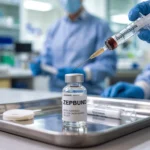Cocaine addiction is not just an issue of the brain and the body; it is an issue of the soul. Addiction recovery is not just about quitting the drug, but also about changing habits, behavior, and the way one thinks. People are on the lookout for the most effective cocaine addiction treatments, and the good news is that they are receiving cutting-edge care that combines evidence-based approaches, medical treatments, and holistic approaches that incorporate all aspects of healing.
Cocaine addiction treatment methods may appear daunting at first, but with the right recovery plan, one is easily able to achieve long-term sobriety and find a new purpose.
The Science Behind Cocaine Addiction Treatment
Recovery from cocaine addiction successfully combines medical and psychological approaches. To begin with, the medical staff are responsible for the detox when the body is allowed to clean itself of the drugs with medical supervision. During detoxification, the medical staff will monitor patients to observe and manage their medical symptoms of fatigue, depression, and irritability to make them as comfortable as possible.
Behavioral therapy, counseling, and support come into play after detox. These approaches focus on the root causes of addiction and jump-start the healing process. Individuals learn to identify triggers, adopt new thought patterns, and strengthen their emotional muscles.
Knowing the effects of cocaine on the body and the brain helps clinicians develop and customize recovery treatments to address addiction-specific neuro-chemical imbalances and devise a plan for sustainable recovery.
Innovative Behavioral Therapies for Cocaine Addiction
Most recovery programs hinge on the incorporation of behavioral therapy. It equips people with the tools to identify and modify the mental frameworks driving their substance use. Key approaches include:
Cognitive Behavioral Therapy (CBT) aims to help people identify the misguided thinking patterns that fuel their cocaine use. It encourages people to challenge their negative and unhelpful beliefs so that the focus shifts to replacing these with positive, realistic ones. CBT also equips people with useful coping techniques that help them deal with stress, cravings, and risky drug use situations.
Contingency Management (CM) relies on a reward system to encourage people to maintain sobriety. It promotes accountability and motivation since people earn rewards for maintaining drug-free urine samples. Research shows CM improves abstinence rates significantly, especially for people recovering from stimulant use disorder.
Motivational Interviewing (MI) – MI is designed to empower people to want to make changes in their lives. In this case, therapists join the clients to help the clients identify the reason(s) for quitting and help them develop goals to achieve this.
When these new therapies are combined, the benefits are enhanced, since the client will receive a more tailored and complete recovery experience.
The Role of Medication-Assisted Treatment
To date, there are no medicines approved to treat cocaine addiction. However, the lack of approved medications for cocaine addiction does not mean that research to find medications to treat cocaine addiction is not ongoing. Some medications that are currently used to treat cocaine addiction target craving control, psychological distress, and brain chemistry imbalances.
Modafinil and disulfiram are two medications that are used to help focus and control some cocaine use and craving. Some antidepressants may then be used to alleviate the anxiety and depressive symptoms seen during recovery.
Behavioral therapy and counseling are critical so that the focus of the medication used does not shift to merely controlling the withdrawal symptoms. The physical and mental health of an individual recovering from cocaine addiction should be stabilized for the remaining withdrawal symptoms to be controlled.
MAT also provides a “safety net” or a predictable and structured environment to keep the individual in their treatment for cocaine addiction. Relapse during the initial recovery period is common and disengagement from treatment increases the likelihood of relapse.
Holistic Approaches in Cocaine Addiction Recovery
Healing from an addiction has to not only consider the chemical aspect but the mind, body, and soul. This is why holistic methods are essential in treating cocaine addiction.
Holistic methods like mind meditation, yoga, art therapy, and exercise therapy helps reduce stress, promote emotional control, and helps a person in addiction to change negatively towards their body in a positive manner.
In addition, many people have diabetes or vastly insufficient minerals within their body, which is why nutritional therapy is important. Cocaine use disorder makes the body significantly tired and depletes vital nutrients. A recovery diet supports brain functioning and stabilizes mood during recovery.
Alternative and especially Western medicine therapeutic practices such as acupressure and massage therapy help nonetheless to lessen anxiety, promote a state of relaxation and improve quality of sleep. Using these methods with therapeutic practices helps the patient feel more empowered.
Importance of Support Systems in Treatment
While recovering from cocaine addiction, one is advised against isolating themselves. The addiction recovery process one attends is not meant to be done in isolation. During cocaine addiction treatment methods, individuals are given a support system in the case of group therapy sessions to help with their progress. A person looking in from the outside is able to not only motivate them but within the sessions are able to learn from others.
Support groups like Narcotics Anonymous (NA) offer vital support as well as accountability. These support groups, fostering connection, help people concentrate on their recovery when formal addiction treatment is over.
So is family treatment. The pain of addiction affects all family members, and family therapy helps direct healing as family members learn to communicate, regain lost trust, and build an encouraging home environment.
With family treatment and peer support groups, all layers of support on cocaine addiction treatment offer people the strength and stability they need during recovery.
Latest Research and Developments in Treatment Strategies
There are new research studies to expand the field of addiction medicine. Among the most important studies surround the use of neurofeedback and brain stimulation to restore the brain to healthy activity post-cocaine use.
For example, new studies on Transcranial Magnetic Stimulation (TMS) therapy are promising. TMS therapy is a non-invasive technique that helps target brain areas that control impulses and craving. Digital therapeutics are another new strategy that help expand treatment access. These are cognitive and behavioral therapy apps and programs created to be used outside of clinical spaces.
More people are interested in looking at vaccines that stop cocaine from triggering pleasure in the brain. These potential treatments hope to reduce the brain’s rewarding response to cocaine to stop addiction relapse. It is in the early stages of development but it taps into the neuroscience advancements that aid cocaine addiction recovery.
Measuring Success and Long-Term Recovery in Cocaine Addiction Treatment
Recovering from addiction is successful when the individual is living a valued, positive life. It includes emotional health, the ability to relate to others, and personal development.
Effective treatments take the aftercare and relapse prevention as their main focus. This means that the person in recovery can ‘cure’ the addiction and attend relapse-preventing sessions to keep them from getting the addiction back.
Preventing relapse and planning aftercare means the cocaine addict can use these techniques to stop them from using cocaine and work on emotional health, self-control, and planning their daily tasks.
Many recovery centers and clinics focus on maintaining and adopting new strategies to help the person stay sober.
Conclusion
Moving past a cocaine addiction takes a great deal of bravery, commitment, and integrated treatment. The best treatments for cocaine addiction combine proven methods of psychotherapy, holistic, and medical care for sustained recovery. There are more treatment options available than ever before, and people are starting to regain and reclaim their lives!
At Silicon Valley Recovery, we appreciate the individuality of the recovery process and offer recovery treatment with compassion and skill. Our addiction specialists develop personalized treatment protocols that encompass the complete addiction cycle. Through scientifically validated methods, and the community programs, we are the recovering sober person, helping them to regain their strength, and restore their lives.







